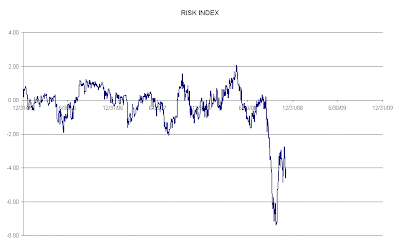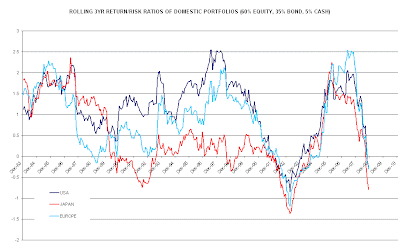Commodities Are a Joke
Welcome to the new month....it's the same as the old month! Frankly, Macro Man isn't sure what to make of yesterday's price action. A week of low-volume aggressive rally is followed by a day of moderate-volume, aggressive sell-off. As he noted last week, it's difficult to discern any forecasting edge for short-term price action.
What we can say is that the bear market remains alive and well. Yesterday's shellacking made it onto Macro Man's list of top 15 worst market days since the end of the first world war. As a public service, he has created a "league table" of bad days, which he will endeavour to maintain on the right side of the website.
Somewhat ominously, Macro Man's preferred (proprietary) measure of risk aversion has started heading lower again, having consolidated in the second half of November at levels suggesting that markets were merely "very" risk averse, rather than the prior shotgun-and-canned-goods of aversion prevailing in October. It doesn't exactly augur for a quiet end to the year.
` 
Yesterday was notable for a couple of other reasons, as well. The NBER has finally acknowledged that the US economy is in a recession; there is no word yet on a likely timetable for announcing the start of the depression. Ben Bernanke, meanwhile, sketched out a roadmap for further policy easing, a game plan that includes the outright purchases of long-term Treasuries to "spur aggregate demand."
As always, however, large government actions carry unintended consequences. While lower long-term rates may be seen as a boon to spending, they also substantially increase the net present value of pension fund liabilities. Coming at a time when declining asset performance has left a hole in pension funds' balance sheets, lower long term rates make the asset-liability mismatch even worse. Among those funds most adversely affected include, quelle surprise, the defined-benefit plans of the Big 3, who themselves are lobbying for fresh government bailouts.
` 
Whether it's pension funds scrambling for duration or exotics desks scrambling for hedges, the performance of the 30 year swap in the US has been truly awe-inspiring. While 30 year swap spreads are off their lows, they still remain sharply negative; the latest print on Macro Man's screen is - 43 bps. Intriguingly, 30 year rates are going so low that asymptotic considerations may soon come into play. Assuming that LIBOR rates do not go negative (and they didn't for any observable period in Japan), your max loss from paying these swaps should be the nominal rate in any one year time horizon. So if you pay it in, say, $10k/bp, you won't lose more than $2.78 mio per year. You won't necessarily make that much per annum either, but Macro Man would argue that this trade is approaching a very high likelihood of ultimate success. Food for thought....
` 
Elsewhere, one of the stories of 2008, when the history is finally written, will be the implosion of the "commodities as an asset class" investment theme. If the pension fund portfolio return chart above had included a 5% allocation to commodities, the returns would look even worse.
One of the silver linings of the commodity market implosion, however, has been the opportunities afforded to people of Macro Man's vintage to indulge in what can only be called "dad jokes".
Macro Man's colleagues cringe whenever commodities edge lower, as he is apt to come up with "gems" like the following:
* Oil is getting drilled * Oil isn't looking too slick * Nat gas is getting burned * Gold has lost its luster * Silver's looking tarnished * Copper's getting smelted * Wheat's getting scythed down * Sugar ain't looking too sweet * Coffee's getting roasted * Cotton's getting put through the mill * Soybeans have been crushed * Cocoa isn't too hot
All in good fun, of course, and readers are invited to submit their own efforts. For anyone or any fund who bought into the hype in the first half of this year, however, the performance of commodities is no laughing matter.
![[Most Recent Quotes from www.kitco.com]](http://www.weblinks247.com/indexes/gfms.gif)
![[Most Recent Quotes from www.kitco.com]](http://www.kitconet.com/charts/metals/base/spot-copper-30d.gif)
![[Most Recent Quotes from www.kitco.com]](http://www.kitconet.com/charts/metals/base/zinc-d.gif)
![[Most Recent Quotes from www.kitco.com]](http://www.kitconet.com/charts/metals/base/lead-d.gif)
![[Most Recent Quotes from www.kitco.com]](http://www.kitconet.com/charts/metals/base/spot-nickel-30d.gif)









































